高考重点词汇用法精讲-第一讲
- 格式:doc
- 大小:32.00 KB
- 文档页数:7
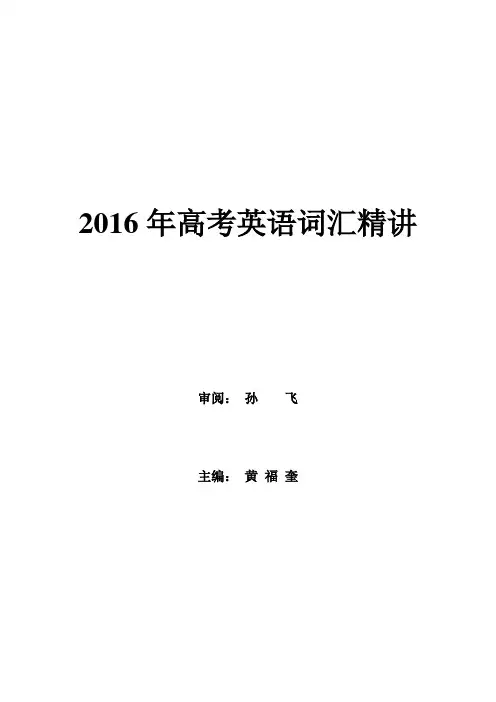
2016年高考英语词汇精讲审阅:孙飞主编:黄福奎词汇精讲1【重点动词】:stare凝视;recover恢复;base基础;launch发射;request请求;transport运输;prefer偏爱;march行军;stand忍耐.(1)stare /steə(r)/[vi] .盯着看;显眼;倒立,直竖起;【固定短语】:stare at盯着;[vt].凝视;盯着他的眼睛;[n].凝视,瞪视;【词形变换】:第三人称单数:stares;过去分词:stared;现在进行时:staring;过去式:stared;【例句】:Why did you stare at teacher's face in the history exam? 刚才考历史,你为什么总盯着监考老师的眼睛?We stared at him in amazement. 我们惊奇地注视着他。
【词义辨析】:gaze, gape, glance, glare, glimpse, peer, peep, stare这两个单词虽然都表示“匆匆地一望”,但是glance表示有意地、有目的地一望,有时带有暗暗地看的含义(区别于“正视”)。
因此与之搭配地动词一般都是指主语有意发出的动作,如cast a glance at(向看一眼), give a glance(望一眼), take a glance(匆匆一看,浏览); 而glimpse 则大都表示“无意地、无目的地偶然、碰巧地一望”,现在多用作名词,强调看到的不是全貌。
与之搭配的动词一般都是指主语非有意发出的动作,如catch (have, get, gain, obtain)a glimpse. 如:His father threw a disapproving glance at him.他父亲不满地瞥了他一眼。
He glanced over the letter he had just received.他把刚收到的那封信粗略地看了一遍。
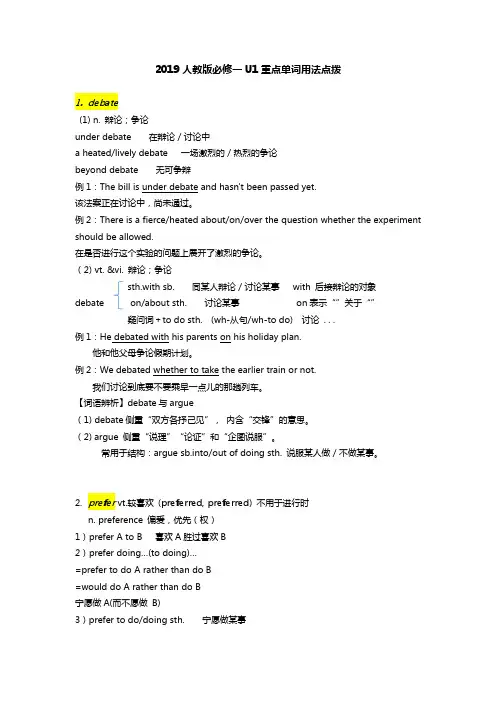
2019人教版必修一U1重点单词用法点拨1.debate(1) n. 辩论;争论under debate 在辩论/讨论中a heated/lively debate 一场激烈的/热烈的争论beyond debate 无可争辩例1:The bill is under debate and hasn't been passed yet.该法案正在讨论中,尚未通过。
例2:There is a fierce/heated about/on/over the question whether the experiment should be allowed.在是否进行这个实验的问题上展开了激烈的争论。
(2) vt. &vi. 辩论;争论sth.with sb. 同某人辩论/讨论某事with 后接辩论的对象debate on/about sth. 讨论某事on表示“”关于“”疑问词+to do sth. (wh-从句/wh-to do) 讨论 . . .例1:He debated with his parents on his holiday plan.他和他父母争论假期计划。
例2:We debated whether to take the earlier train or not.我们讨论到底要不要乘早一点儿的那趟列车。
【词语辨析】debate与argue(1) debate侧重“双方各抒己见”,内含“交锋”的意思。
(2) argue 侧重“说理”“论证”和“企图说服”。
常用于结构:argue sb.into/out of doing sth. 说服某人做/不做某事。
2.prefer vt.较喜欢(preferred, preferred) 不用于进行时n. preference 偏爱,优先(权)1)prefer A to B 喜欢A胜过喜欢B2)prefer doing…(to doing)…=prefer to do A rather than do B=would do A rather than do B宁愿做A(而不愿做B)3)prefer to do/doing sth. 宁愿做某事4)prefer sb./sth.to do sth = prefer that sb. (should) do sth. 宁愿某人做某事例1:I prefer the red dress to the blue one because it suits me better.比起那条绿裙子,我更喜欢那条红色的,因为它更适合我。
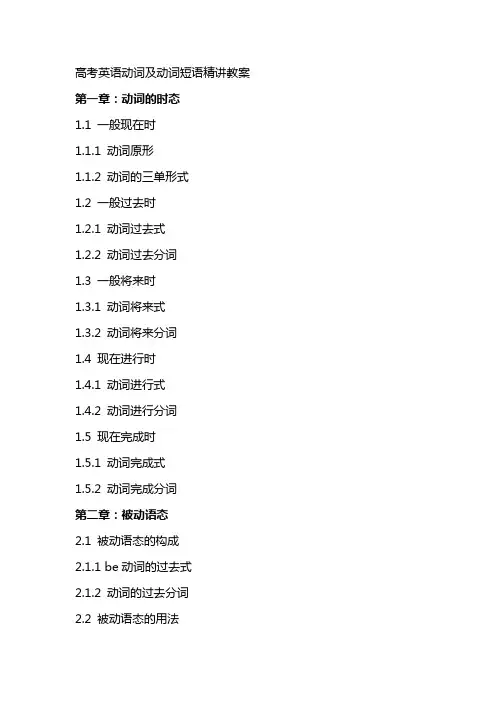
高考英语动词及动词短语精讲教案第一章:动词的时态1.1 一般现在时1.1.1 动词原形1.1.2 动词的三单形式1.2 一般过去时1.2.1 动词过去式1.2.2 动词过去分词1.3 一般将来时1.3.1 动词将来式1.3.2 动词将来分词1.4 现在进行时1.4.1 动词进行式1.4.2 动词进行分词1.5 现在完成时1.5.1 动词完成式1.5.2 动词完成分词第二章:被动语态2.1 被动语态的构成2.1.1 be动词的过去式2.1.2 动词的过去分词2.2 被动语态的用法2.2.1 表达动作的承受者2.2.2 强调动作的承受者2.3 被动语态的转换2.3.1 将主动语态转换为被动语态2.3.2 将被动语态转换为主动语态第三章:情态动词3.1 can和may3.1.1 表示能力3.1.2 表示请求3.2 must和have to3.2.1 表示必须3.2.2 表示需要3.3 shall和will3.3.1 表示承诺3.3.2 表示意愿3.4 should和ought to3.4.1 表示应该3.4.2 表示建议第四章:动词短语4.1 动词+副词4.1.1 举例:look after,run quickly 4.2 动词+介词4.2.1 举例:put on,go to4.3 动词+名词4.3.1 举例:make a decision,take a picture 4.4 动词+动词4.4.1 举例:try to do,help with第五章:动词辨析5.1 动词词义辨析5.1.1 举例:see-watch,read-study5.2 动词搭配辨析5.2.1 举例:make-have,get-obtn5.3 动词时态辨析5.3.1 举例:go-went,do-did第六章:动词的语态6.1 主动语态6.1.1 动词原形6.1.2 动词的进行式6.2 被动语态6.2.1 be动词的过去式6.2.2 动词的过去分词6.3 语态的转换6.3.1 主动语态转换为被动语态6.3.2 被动语态转换为主动语态第七章:情态动词的用法7.1 can和may7.1.1 表示能力7.1.2 表示请求7.2 must和have to7.2.1 表示必须7.2.2 表示需要7.3 shall和will7.3.1 表示承诺7.3.2 表示意愿7.4 should和ought to7.4.1 表示应该7.4.2 表示建议第八章:动词短语的辨析8.1 动词+副词8.1.1 举例:look after,run quickly8.2 动词+介词8.2.1 举例:put on,go to8.3 动词+名词8.3.1 举例:make a decision,take a picture 8.4 动词+动词8.4.1 举例:try to do,help with第九章:动词辨析与应用9.1 动词词义辨析9.1.1 举例:see-watch,read-study 9.2 动词搭配辨析9.2.1 举例:make-have,get-obtn 9.3 动词时态辨析9.3.1 举例:go-went,do-did9.4 动词在特定语境中的应用9.4.1 举例:put off,make up第十章:动词综合练习10.1 动词填空练习10.1.1 选择合适的动词形式填空10.1.2 根据语境选择正确的动词时态10.2 动词短语选择练习10.2.1 根据语境选择合适的动词短语10.2.2 改写句子,使用不同的动词短语10.3 动词辨析练习10.3.1 选择正确的动词10.3.2 根据语境选择合适的动词形式第十一章:动词与介词的搭配11.1 常见介词与动词的搭配11.1.1 举例:get up,put down11.2.1 表示位置关系11.2.2 表示动作方向11.3 动词与介词搭配的练习11.3.1 根据语境选择合适的介词11.3.2 完成句子,使用给定的动词和介词第十二章:动词与副词的搭配12.1 常见副词与动词的搭配12.1.1 举例:run quickly,speak loudly 12.2 动词与副词搭配的意义12.2.1 表示程度12.2.2 表示方式12.3 动词与副词搭配的练习12.3.1 根据语境选择合适的副词12.3.2 改写句子,使用不同的副词第十三章:动词与名词的搭配13.1 动词与名词搭配的类型13.1.1 动宾搭配13.1.2 动状搭配13.2 动词与名词搭配的意义13.2.1 表示动作的对象13.2.2 表示动作的状态13.3.1 根据语境选择合适的名词13.3.2 完成句子,使用给定的动词和名词第十四章:动词与形容词的搭配14.1 动词与形容词搭配的类型14.1.1 动词+形容词作宾语14.1.2 动词+形容词作状语14.2 动词与形容词搭配的意义14.2.1 表示主语的状态14.2.2 表示动作的特点14.3 动词与形容词搭配的练习14.3.1 根据语境选择合适的形容词14.3.2 改写句子,使用不同的形容词第十五章:动词综合应用15.1 动词在不同语境中的应用15.1.1 口语交流15.1.2 书面表达15.2 动词短语的创造性使用15.2.1 改写句子,使用不同的动词短语15.2.2 创作短文,运用所学动词和短语15.3 动词复习与测试15.3.1 完成填空题15.3.2 解答选择题重点和难点解析1. 动词的时态:一般现在时、一般过去时、一般将来时、现在进行时和现在完成时。
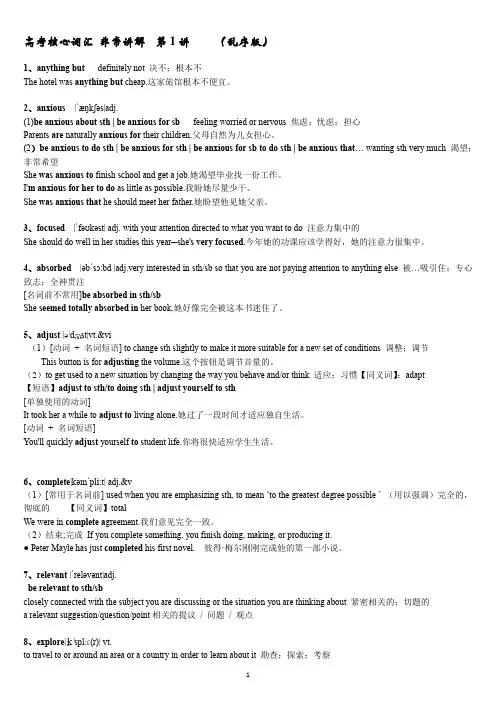
高考核心词汇非常讲解第1讲(乱序版)1、anything but definitely not 决不;根本不The hotel was anything but cheap.这家旅馆根本不便宜。
2、anxious |ˈæŋkʃəs|adj.(1)be anxious about sth | be anxious for sb feeling worried or nervous 焦虑;忧虑;担心Parents are naturally anxious for their children.父母自然为儿女担心。
(2)be anxious to do sth | be anxious for sth | be anxious for sb to do sth | be anxious that… wanting sth very much 渴望;非常希望She was anxious to finish school and get a job.她渴望毕业找一份工作。
I'm anxious for her to do as little as possible.我盼她尽量少干。
She was anxious that he should meet her father.她盼望他见她父亲。
3、focused |ˈfəʊkəst| adj. with your attention directed to what you want to do 注意力集中的She should do well in her studies this year─she's very focused.今年她的功课应该学得好,她的注意力很集中。
4、absorbed |əbˈsɔ:bd |adj.very interested in sth/sb so that you are not paying attention to anything else 被…吸引住;专心致志;全神贯注[名词前不常用]be absorbed in sth/sbShe seemed totally absorbed in her book.她好像完全被这本书迷住了。

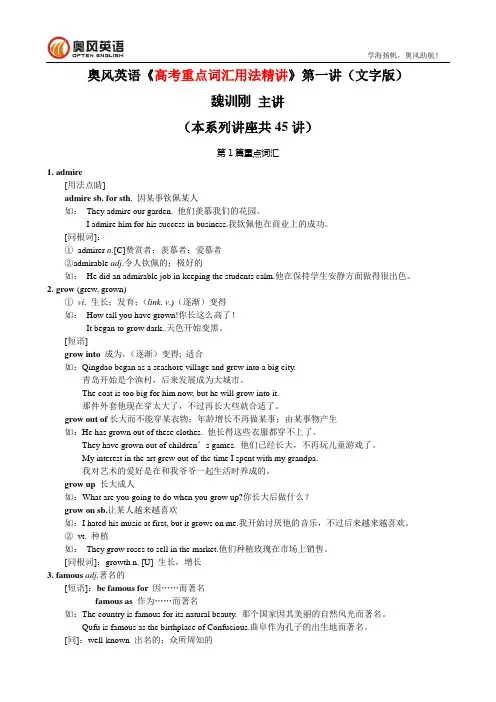
奥风英语《高考重点词汇用法精讲》第一讲(文字版)魏训刚主讲(本系列讲座共45讲)第1篇重点词汇1. admire[用法点睛]admire sb. for sth. 因某事钦佩某人如:They admire our garden. 他们羡慕我们的花园。
I admire him for his success in business.我钦佩他在商业上的成功。
[同根词]:①admirer n.[C]赞赏者;羡慕者;爱慕者②admirable adj.令人钦佩的;极好的如:He did an admirable job in keeping the students calm.他在保持学生安静方面做得很出色。
2. grow (grew, grown)①vi. 生长;发育;(link. v.)(逐渐)变得如:How tall you have grown!你长这么高了!It began to grow dark..天色开始变黑。
[短语]grow into成为,(逐渐)变得; 适合如:Qingdao began as a seashore village and grew into a big city.青岛开始是个渔村,后来发展成为大城市。
The coat is too big for him now, but he will grow into it.那件外套他现在穿太大了,不过再长大些就合适了。
grow out of长大而不能穿某衣物;年龄增长不再做某事;由某事物产生如:He has grown out of these clothes. 他长得这些衣服都穿不上了。
They have grown out of children’s games. 他们已经长大,不再玩儿童游戏了。
My interest in the art grew out of the time I spent with my grandpa.我对艺术的爱好是在和我爷爷一起生活时养成的。
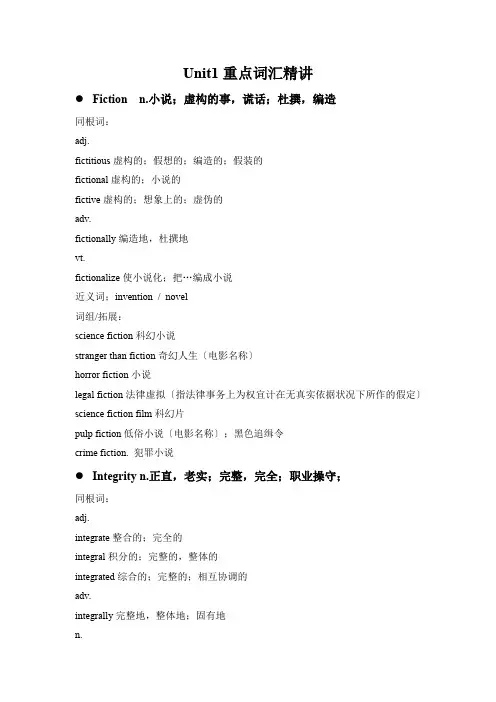
Unit1重点词汇精讲●Fiction n.小说;虚构的事,谎话;杜撰,编造同根词:adj.fictitious虚构的;假想的;编造的;假装的fictional虚构的;小说的fictive虚构的;想象上的;虚伪的adv.fictionally编造地,杜撰地vt.fictionalize使小说化;把…编成小说近义词;invention/novel词组/拓展:science fiction科幻小说stranger than fiction奇幻人生〔电影名称〕horror fiction小说legal fiction法律虚拟〔指法律事务上为权宜计在无真实依据状况下所作的假定〕science fiction film科幻片pulp fiction低俗小说〔电影名称〕;黑色追缉令crime fiction. 犯罪小说●Integrity n.正直,老实;完整,完全;职业操守;同根词:adj.integrate整合的;完全的integral积分的;完整的,整体的integrated综合的;完整的;相互协调的adv.integrally完整地,整体地;固有地n.integrate一体化;集成体integral积分;局部;完整integer[数] 整数;整体;完整的事物近义词;truth/honesty/full/righteousness词组/拓展:territorial integrity领土的完整moral integrity节操;气节data integrity数据完整性structural integrity结构完整性business integrity商业信誉personal integrity正直的人品;个人诚信surface integrity外表完整性;外表质量integrity test完整性测试;无损试验referential integrity参照完整性;引用完整性●Absurd adj.愚蠢的,荒唐的;滑稽可笑的;荒唐派的同根词:adv.absurdly荒唐地;愚蠢地;悖理地n.absurdity荒唐;谬论;荒唐的言行absurdness荒唐;愚蠢;不合理近义词;ridiculous/preposterous词组/拓展:theatre of the absurd荒唐剧场;荒唐派戏剧absurd theory谬论absurd world荒唐的世界Absurd arguments奇谈怪论●Appointment n.约会,商定;任命,委派;同根词:adj.appointed商定的,指定的appointive任命的;委派的n.appointee被任命者近义词;convention/bond/nomination词组/拓展:make an appointment约会,预约make an appointment with与某人约会have an appointment有约会appointment system委任制by appointment根据商定letter of appointment委任书,聘书appointment book记事簿;预约簿Guilty adj.内疚的,惭愧的;有罪的,有过失的同根词:adj.guiltless无罪的,无辜的;没有…的,不知…的adv.guiltily内疚地;有罪地n.guilt犯罪,过失;内疚近义词;sinful/culpable词组/拓展:guilty of有……之过错;对……感到内疚plead guilty服罪;[经]被告服罪feel guilty感到内疚feel guilty about感到愧疚guilty conscience内疚be found guilty被认定有罪guilty party有罪一方当事人guilty feeling罪反感●Dismiss v.开除,解雇;不考虑,不理睬;同根词:adj.dismissive表示轻视的;解雇的n.dismissal解雇;开除近义词;remove/fire out词组/拓展:dismiss from解雇;开除dismiss employees辞退员工dismiss a charge驳回指控●Declare v.宣布,声明;断言,宣称;申报;同根词:adj.declared公然的;公开宣布的declarative宣言的;陈述的,说明的n.declaration〔纳税品等的〕申报;宣布;公告;申诉书declarer申报者;宣言者近义词;bill/state词组/拓展:declare oneself显露身分;发表意见declare for. 说明赞成〔拥护〕nothing to declare绿色通道;不需报关declare bankruptcy宣告破产declare war onv 发动进攻;对…宣战declare on宣布●Superior adj.〔规模或实力〕更大的,更强的,(在品质上)更好的;同根词:adv.superiorly超越其他地;卓越地n.superiority优越,优势;优越性近义词;higherup/prefect词组/拓展:superior quality优质,上等品;高级货品superior performance性能优越superior in在…方面优越superior court高等法院;上级法院superior to others高人一等;优于其他superior goods优等物品immediate superior直接上级superior officer上司;上级官员superior room精致客房;高级客房superior limit上限superior education超前教育●Conflict with 冲突;与……抵触同根词:adj. conflicting冲突的;相冲突的;不全都的近义词;interference/difference/war/battle/collision词组/拓展:in conflict with和…冲突conflict with冲突;与…抵触in conflict有冲突;不全都conflict of interest利益冲突;公职人员对公众义务与其本身利益相冲突conflict resolution冲突解决;冲突消退cultural conflict文化冲突conflict management冲突管理;冲突处理armed conflict武装冲突conflict of laws法律之间冲突,法律冲突culture conflict文化冲突role conflict角色冲突conflict rules冲突法规conflict theory冲突理论;冲突论conflict detection冲突检测;冲突侦测conflict zone纷争地带;冲突地带;战斗启示录class conflict阶级冲突;阶级斗争racial conflict种族冲突mental conflict精神冲突;心理冲突goal conflict目标冲突;目标之间的冲突open conflict外部冲突;公开冲突Random adj.任意的,随机的,胡乱的;同根词:adj.randomized[数] 随机化的,随机的adv.randomly任凭地,任意地;无目的,胡乱地;未加方案地n.randomness随便;无支配;不行测性近义词;stochastic/arbitrary词组/拓展:at random胡乱地;任凭地;任意地random sampling随机抽样;随便采样random variable随机变数,随机变量;无规变量random vibration随机振动random number随机数random noise随机噪声;不规那么噪声random access随机存取random process随机过程;随机程序random sample随机样本;随便抽取调查;随机样品random field随机场random walk随机游动;无规行走random error随机误差;偶然误差random selection随机选择;随机抽样random signal随机信号random number generator随机数发生器;随机数生成程序random access memory随机存取存储器simple random sampling简洁随机抽样random sequence随机序列Explode v.〔使〕爆炸,〔使〕爆破;急剧扩大,激增;同根词:adj.explosive爆炸的;爆炸性的;爆发性的exploded爆炸了的;分解的;被破除的adv.explosively爆发地,引起爆炸地n.explosion爆炸;爆发;激增explosive炸药;爆炸物近义词;shoot/spring/blast词组/拓展:explode into爆发出…。
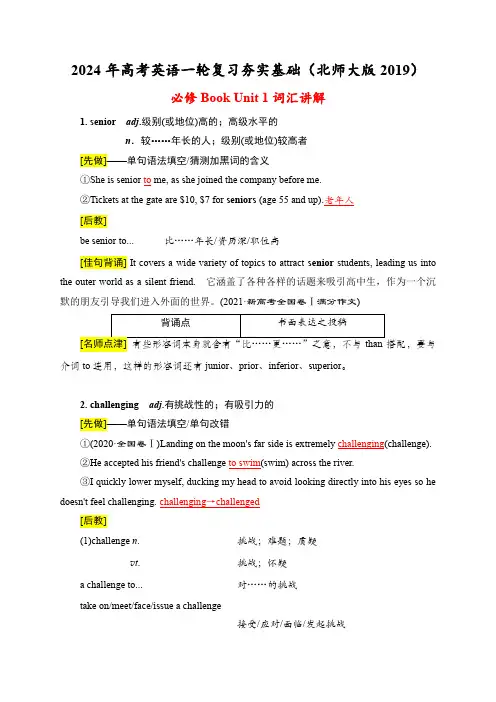
2024年高考英语一轮复习夯实基础(北师大版2019)必修Book Unit 1词汇讲解1. senior adj.级别(或地位)高的;高级水平的n.较……年长的人;级别(或地位)较高者[先做]——单句语法填空/猜测加黑词的含义①She is senior to me, as she joined the company before me.②Tickets at the gate are $10, $7 for seniors (age 55 and up).老年人[后教]be senior to...比……年长/资历深/职位高[佳句背诵] It covers a wide variety of topics to attract senior students, leading us into the outer world as a silent friend.它涵盖了各种各样的话题来吸引高中生,作为一个沉默的朋友引导我们进入外面的世界。
(2021·新高考全国卷Ⅰ满分作文)介词to连用,这样的形容词还有junior、prior、inferior、superior。
2. challenging adj.有挑战性的;有吸引力的[先做]——单句语法填空/单句改错①(2020·全国卷Ⅰ)Landing on the moon's far side is extremely challenging(challenge).②He accepted his friend's challenge to swim(swim) across the river.③I quickly lower myself, ducking my head to avoid looking directly into his eyes so he doesn't feel challenging. challenging→challenged[后教](1)challenge n.挑战;难题;质疑v t. 挑战;怀疑a challenge to... 对……的挑战take on/meet/face/issue a challenge接受/应对/面临/发起挑战challenge sb. to (do) sth.向某人挑战(做)某事/要求某人做某事(2)challenged adj. 受到挑战的[佳句背诵] Many Chinese brands, having developed their reputations over centuries, are facing new challenges from the modern market.很多享誉数百年的中国品牌现在正面临着现代市场带来的新挑战。
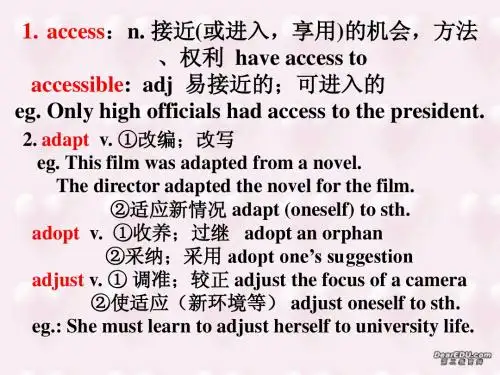
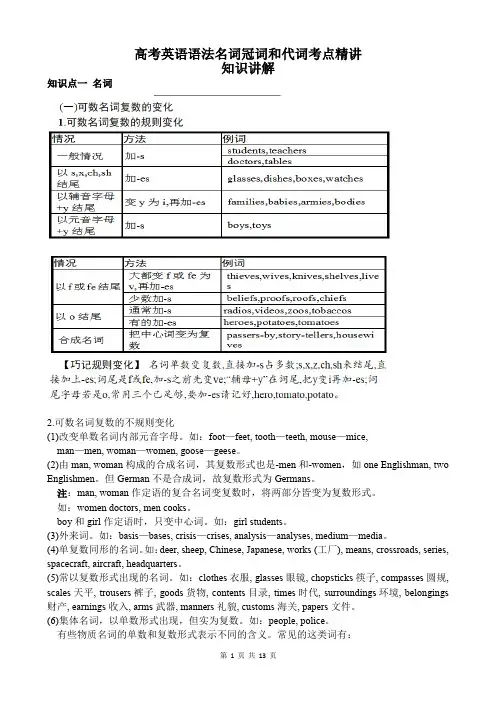
高考英语语法名词冠词和代词考点精讲知识讲解知识点一名词2.可数名词复数的不规则变化(1)改变单数名词内部元音字母。
如:foot—feet, tooth—teeth, mouse—mice,man—men, woman—women, goose—geese。
(2)由man, woman构成的合成名词,其复数形式也是-men和-women,如one Englishman, two Englishmen。
但German不是合成词,故复数形式为Germans。
注:man, woman作定语的复合名词变复数时,将两部分皆变为复数形式。
如:women doctors, men cooks。
boy和girl作定语时,只变中心词。
如:girl students。
(3)外来词。
如:basis—bases, crisis—crises, analysis—analyses, medium—media。
(4)单复数同形的名词。
如:deer, sheep, Chinese, Japanese, works (工厂), means, crossroads, series, spacecraft, aircraft, headquarters。
(5)常以复数形式出现的名词。
如:clothes衣服, glasses眼镜, chopsticks筷子, compasses圆规, scales天平, trousers裤子, goods货物, contents目录, times时代, surroundings环境, belongings 财产, earnings收入, arms武器, manners礼貌, customs海关, papers文件。
(6)集体名词,以单数形式出现,但实为复数。
如:people, police。
有些物质名词的单数和复数形式表示不同的含义。
常见的这类词有:paper纸—papers论文water水—waters水域custom习惯—customs海关manner方式—manners礼貌look看—looks外貌time时间—times时代wood木材—woods树林sand沙子—sands沙滩注:表示“两个人共有……”时,需在最后一个名词后加“-s”;当表示“两个人各自有……”时,两个名词后都要加“-s”。

高中英语真题:高考必考点精讲第一讲时态语态和非谓语动词《课程标准》和《高考大纲》规定:时态、语态和非谓语动词的用法都是教与学的难点,高考的必考点。
一、时态:时间决定动词的形式。
高考要考十种时态。
他们是一般现在时、一般将来时、现在进行时、现在完成时、现在完成进行时、一般过去时、过去将来时、过去进行时、过去完成时和过去完成进行时。
最后冲刺阶段要在时态中习得举一反三的能力。
一般现在时与一般过去时、一般将来时与过去将来时、现在进行时与过去进行时、现在完成时与过去完成时都是两两相通的,知其一便得其二,如此就学会英语中常见的八种时态。
而其他由时态两两结合而形成的时态就不是难题。
【高考连接】【2012天津】12. The three of us ________ around Europe for about a month last summer.A. traveledB. have traveledC. had traveledD. travel【答案】A【2012重庆】27. Food supplies in the flood-stricken area ________.We must act immediately before there’s none left.A. have run outB. are running outC. have been run outD. are being run out【答案】B现在完成进行时 = 现在完成时 + 现在进行时;过去完成进行时 = 过去完成时 + 过去进行时,等等。
面对难点,考生们关键是要掌握触类旁通和归纳能力。
【高考连接】【2012全国卷II】⒙ The manager ________ the workers how to improve the pro gram since9 a.m.A. has toldB. is tellingC. has been tellingD. will have told【答案】C【2012安徽】26. In order to find the missing child , villagers all they can over the past five hours.A. didB. doC. had doneD. have been doing【答案】D二、被动语态:第一必须记住只有及物动词才有被动语态。
Unit 1 知识点讲解词汇:account【名词account】account作名词时,有很多意思,这里只讲两个常用的意思:① an arrangement that sb. has with a bank to keep money there 银行帐户② a written or spoken description of sth. that has happened 描述;叙述;报告例如:Do you have an account with the Bank of Construction?你在建设银行有帐户吗?She gave the police a full account of the incident.她向警方详尽地叙述了所发生的事情。
【动词account】account作动词时,也有两层常见的意思:① to give an explanation or reason for解释;说明(当作此意思解时,经常构成固定搭配account for)② to consider认为例如:The poor weather may have accounted for the small crowd.天气不好可能是人来得少的原因。
The event was accounted a success.人们认为这次活动很成功。
【即学即练】将下列句子翻译成汉语,注意account的不同意思。
1. The diaries contained detailed accounts of the writer’s experiences in China.2. Do you have a bank account?3. He has been educated in England, which accounts for his proficiency in the English language.4. Lack of money accounts for her discontinuing her studies.5. He has to account to the chairman for how he spends the company’s money.1. 日记详细记述了作者在中国的经历。
【高考一轮复习考点专题精讲】第一部分语言文字运用03.1正确使用词语(包括熟语)教学目标明确考点要求,掌握正确使用词语(包括熟语)的方法技巧教学重点正确使用词语(包括熟语)的几种辨析方法。
教学难点探究做题规律教学过程一考点概要正确使用词语是语言文字运用题的热点。
对词语的考查,理解词语在具体语境中的意义和根据语境正确使用词语。
主要有两种常见题型:一种是根据语境辨析使用词语,包括成语填空(2022年新高考1卷题型);另一种是判断词语使用的正误(选择题,历年常规题型)。
二题点讲解题点1从三个方面辨析近义词语同义词或近义词之间的差别,一般可以从以下三个方面辨析:(一)从词义方面辨析(二)从用法方面辨析(三)从感情色彩方面辨析(一)从词义方面辨析1.词义的轻重不同(详见课件)[例1]依次填入下列各句横线处的词语,最恰当的一组是(B)(1)在青藏高原的雪山中也有热带风光,也长着香蕉和菠萝,这实在是一件令人啧啧的事。
(2)在全球环境与气候合作中,中国是值得欧盟的实力伙伴,中欧应携手致力于全球可持续发展。
(3)这位著名导演运用美术中的色彩和构图,表现电影的气氛、意境和思想内涵。
A.称道信赖善于B.称奇信赖擅长C.称奇信任善于D.称道信任擅长小积累:词义前轻后重的近义词组请求—恳求批评—批判担心—担忧研究—研讨损坏—破坏固执—顽固希望—期望—渴望轻视—蔑视—藐视2.词义的侧重点不同不同的实词有不同的侧重点,近义实词可根据意义侧重点的不同进行辨析。
(详见课件)[例2]依次填入下列各句横线处的词语,最恰当的一组是(A)(1)紫禁城建造之初,就对排水系统进行了测量、精密设计和精细施工。
(2)转过山角,悄无声息地盘桓着一段古潭般的河湾。
一片暗绿扑上眉睫,浑身一阵清凉。
溪水到这里更加澄澈,像一汪流动的绿玻璃。
(3)校长找到几名同学详细询问,才知道事情的。
原来这些书是一个书贩来推销的,开始同学们都不想买,可是这个书贩说他是大学生,要勤工俭学,大家才买的。
高中英语重点词汇精讲abandon: vt.放弃,遗弃abandon medicine for literature 弃医从文;desert:遗弃,抛弃on a deserted island. ability: n 能力,才能:have the ability to do…=be capable of doing…有能力做……able: adj.有能力的:an able leader; be able to与can的区别:can只有现在(can)和过去(could)两种形式,而be able to可有各种时态。
(详见情态动词)。
The fire spread through the hotel very quickly, but everyone ______get out.A . could B. was able to C. can D. must (B)aboard: adv./prep在船(飞机,车)上. Aboard=on board; All aboard!请上船;开船啦。
Welcome aboard!请上船(飞机,车)about: prêt./adv.在周围,在身边;关于(on更严肃,正式);大约:be about to do... (=be at/on the point of doing...)即将做。
后不能接soon, at once等时间状语;How about +doing/名词/代词/句子等...=What about..做......好吗?①I have no money about me. ②Have you heard of the story about Shakespeare?about two yeas=two years pr so =some two yearsAll the mariners ____died except the one who shot the bird left to tell his story to others, which wasdescribed in the poem called “The Rime of the Ancient Mariner.”A. on a boardB. on aboardC. on boardsD. aboardabroad: adv. be (go/live/travel) abroad; come (return ) from abroad; both at home and abroad在国内外;be all abroad离题,不中肯absence: n. absent: adj. 不在,缺席;不在意的:He will be absent at the meeting from Beijing.(不在北京)He will be absent at the meeting in Beijing.(外出在北京)Absence of mind心不在焉;反义词:present出席的,在场的,用法和absent一样,但作定语要后置(n.礼物,at present 目前)_______got a present at the party. (A)A. All presentB. Present allC. All presentingabsorb: vt.吸收(声音,光线,液体等),吸收,理解(知识等);Be absorbed in全神贯注于。
高考词汇精讲第一组( 2019 版)不论用什么方法,把单词、词组背下来了就是好方法。
[ 选用日期]v.[??b?nd?n](不管责任等)离弃,扔掉;(不得而已)舍弃,扔掉;堕入,沉沦于(某种感情)n.[??b?nd?n] 听任,放纵派生词: abandoned, abandonment【W ord forms】 3rd person singular present tense abandons;(第三人称单数形式为:abandons)present participle abandoning;(此刻分词形式为 abandoning)past tense , past participle abandoned(过去式、过去分词为abandoned)【助记 1】 a(一个) ban don(笨蛋)一个笨蛋自然会被扔掉。
【助记 2】a(一个) ban don(板凳)一个没用的板凳自然会被扔掉。
【例】 v. (不管责任、义务等)离弃,遗弃,扔掉【英英释义】 If you abandon a place, thing, or person, you leave the place,thing, or person permanently or for a long time, especially when you should notdo so.E.g.:1)He claimed that his parents hadabandoned him.参照译文:他宣称父亲母亲遗弃了他。
2)The road is strewn with abandoned vehicles.参照译文:道路上尽是弃置的车辆。
【s ynonyms】leave, strand, , leave behind【例】 v. 中断;放弃;不再有【英英释义】 If you abandon an activity or piece of work, you stop doing it before it is finished.E.g.:They abandoned the match because of rain.参照译文:由于下雨,他们中断了竞赛。
奥风英语《高考重点词汇用法精讲》第一讲(文字版)魏训刚主讲(本系列讲座共45讲)第1篇重点词汇1. admire[用法点睛]admire sb. for sth. 因某事钦佩某人如:They admire our garden. 他们羡慕我们的花园。
I admire him for his success in business.我钦佩他在商业上的成功。
[同根词]:①admirer n.[C]赞赏者;羡慕者;爱慕者②admirable adj.令人钦佩的;极好的如:He did an admirable job in keeping the students calm.他在保持学生安静方面做得很出色。
2. grow (grew, grown)①vi. 生长;发育;(link. v.)(逐渐)变得如:How tall you have grown!你长这么高了!It began to grow dark..天色开始变黑。
[短语]grow into成为,(逐渐)变得; 适合如:Qingdao began as a seashore village and grew into a big city.青岛开始是个渔村,后来发展成为大城市。
The coat is too big for him now, but he will grow into it.那件外套他现在穿太大了,不过再长大些就合适了。
grow out of长大而不能穿某衣物;年龄增长不再做某事;由某事物产生如:He has grown out of these clothes. 他长得这些衣服都穿不上了。
They have grown out of children’s games. 他们已经长大,不再玩儿童游戏了。
My interest in the art grew out of the time I spent with my grandpa.我对艺术的爱好是在和我爷爷一起生活时养成的。
grow up长大成人如:What are you going to do when you grow up你长大后做什么grow on sb.让某人越来越喜欢如:I hated his music at first, but it grows on me.我开始讨厌他的音乐,不过后来越来越喜欢。
②vt. 种植如:They grow roses to sell in the market.他们种植玫瑰在市场上销售。
[同根词]:growth n. [U] 生长,增长3. famous adj.著名的[短语]:be famous for 因……而著名famous as 作为……而著名如:The country is famous for its natural beauty. 那个国家因其美丽的自然风光而著名。
Qufu is famous as the birthplace of Confucious.曲阜作为孔子的出生地而著名。
[同]:well-known 出名的;众所周知的[反]:unknown 不为人所知的[同根词]:infamous adj. 臭名昭著的;声名狼藉的4. different adj. 不同的;差异的[用法点睛] be different from 与……不同;be different in在某方面不同如:Our sons are very different from each other.我们的儿子们差异很大。
They are different in character. 他们性格不同。
[同根词]:①differ vi.不同;不像[用法点睛] differ from与……不同differ with sb. on/about sth.与……意见不同②difference n. [C, U]不同,差别,差距[用法点睛] difference between A and B A与B之间的不同make a difference (to sb./sth.) 使有差异;对(某人、物)有影响make no difference 没有差别;没有影响;不重要如:It makes no difference (to me) whether you go today or tomorrow.你今天去还是明天去(对我来说)没什么差别。
5. distribute vt.分发;分配;提供(商品供销售)[用法点睛] distribute sth. to/among sb. 向某人分发某物;在某群人中分发如:The man is distributing leaflets to passers-by.那个人正在向路人发传单。
Milk is distributed to the local shops by the farm.牛奶由那家农场提供给当地的商店销售。
[同根词] distribution n. [C U] 分配;配送;分布6. give vt. vi. (gave, given)给;给予;赠送[用法点睛] give sb. sth./give sth. to sb.给某人某物如:I gave each of the boys an apple. 我给每个孩子一个苹果。
=I gave an apple to each of the boys.[短语]give away赠送;分发;泄露;出卖give back归还give in (to sb.) (向某人)屈服;让步;投降;上交give off发出(烟、气味等)give out用完;耗尽;筋疲力尽;分发;宣布;(机器)停止运转;出故障give up (doing) 放弃;停止7. success n. [U]成功;[C]成功的人或事如:Hard work is the key to success. 努力工作是成功的关键。
He was a success as a teacher. 他是一个成功的老师。
[同根词]:①successful adj. 成功的②succeed vi. 成功;继承;vt.接替[用法点睛] succeed in doing 在做某事方面成功;成功做成某事succeed to sth.继承(某物)如:He succeeded in winning the game. 他成功地赢了比赛。
He succeeded to his father’s kingdom. 他继承了父亲的王国。
Who do you think will succeed Obama as president 你认为谁将接替奥巴马做总统8. search vt. vi. 搜寻(某人);细查(某地)以寻找某人或物[用法点睛] search a place/sb. 搜查某地/人(以寻找某物)search for sth./sb. 搜寻某物/人如:They searched the forest for the missing men.他们搜查森林以寻找失踪的人们。
[高考例句] The newcomer went to the library the other day and searched for whatever he could find about Mark Twain.这位新生那天去图书馆寻找所有他能找到的关于马克·吐温的资料。
9. share vt. vi. 分享;n. [C] 一份;份额;股份[用法点睛] share sth. with sb.与某人分享某物如:Tom shared the pie with his friends.汤姆和他的朋友们分享馅饼。
---Have you paid What’s my share of the bill你付过帐了吗我应分担多少---Don’t worry about it. It wasn’t much. 不用担心。
费用不多。
10. borrow vt. (向别人)借;借入;借用[用法点睛] borrow sth. from sb. 向某人借某物[反]:lend vt. (lent, lent) 借(给别人);借出[用法点睛] lend sth. to sb. 将某物借给某人如:He borrowed a book from Xiaoming.他从小明那儿借了本书。
Xiaoming lent a book to him.小明借了本书给他。
注意:表示借多久要用keep。
如:---How long can I keep the book 这本书我可以借多久---Two weeks. 两周。
11. equipment n. [U]设备;装备如:It’s a factory with modern equipment.它是一家有着现代设备的工厂。
[同根词] equip vt. 装备;配备[用法点睛] equip sth. with sth.用某物装备某人/处如:Please equip yourself with a pencil and a rubber for the exam.请准备好铅笔和橡皮迎接考试。
12. own vt.拥有;adj.自己的[短语]:of one’s own (某人)自己的on one’s own 独立地;独自地如:They own 200 acres of farmland. 他们拥有200英亩的农田。
He wants a car of his own. 他想要一辆自己的车。
Mary always does her homework on her own. 玛丽独自做作业。
[同根词] owner n.[C]物主;所有者ownership n. [U]所有(权);所有制13. sale n. [U] 卖;销售;[pl] 销售额;销售量[辨析]:on sale/for saleon sale大甩卖;低价销售如:These gloves were on sale for only $9. 这些手套在低价促销,只卖9美元。
for sale 供出售如:Excuse me, are these for sale 请问这些出售吗[关联记忆]:salesgirl 女售货员;女营业员salesman 推销员;售货员;店员saleswoman 女售货员;女店员14. help vt. vi.帮助;n. [U]帮助; [a ~]帮助者;有帮助的事物[用法点睛] help (to)do sth.帮助做某事help sb. (to) do sth.帮助某人做某事help sb. with sth. 帮助某人做某事can’t help doing忍不住做某事;情不自禁地做某事help oneself to sth. 随意吃/用某物如:Can you help to clean the house 你能帮我们清理房间吗His father helped him (to) start his own business.他的父亲帮他开始了自己的事业。